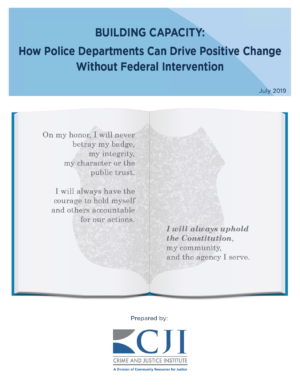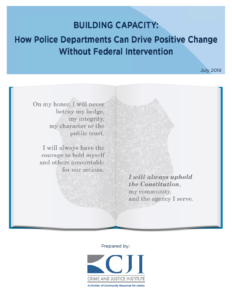
Police departments often operate with decades-old policies. Many police departments don’t have the financial or legal resources for regular and comprehensive policy updates. Police departments are also not required to be accredited, which can serve as a mechanism for a routine review of the legality and currency of policies. Many additional reasons exist.
Since 1994, several dozen police departments in the U.S. have been scrutinized by the federal government after patterns or practices were alleged to be in violation of the U.S. Constitution, while other police departments have been sued by plaintiffs and activist groups for similar reasons. One result of federal intervention, a consent decree*, ensures a police agency complies with the Constitution and engages in constitutional policing. The guidance woven into consent decrees provides vetted, prescriptive, and detailed steps to ensure police actions do not violate the rights of community members. Ultimately, constitutional policing facilitates improved community support and increased legitimacy.
For this report, CJI reviewed consent decrees spanning 20 years and 21 jurisdictions, identified the most common issues, and summarized the mandated requirements in a format that is accessible and useful to police leaders. Few agencies not under investigation use consent decree findings and remedies to review their own agencies; nor do they link the cost of civil lawsuits (often paid by insurance companies) to the need for changes in policy and practice.
Additionally, the checklist in the appendix of the report is intended to be a self-assessment for police executives or other interested parties to identify vulnerabilities and strengthen a department without the cost, scrutiny, and disruption of external oversight.

Access the checklist separate from the report here.
The checklist is organized around three of the most frequently addressed issues in consent decrees:
• Use of Force
• Stops, Searches, and Arrests
• Bias Free Policing
While the self-assessment can serve as a benchmark for constitutional policing, it is not intended to be a comprehensive examination. The items below can be complex and nuanced and presenting them as a yes or no question risks oversimplification. However, this high-level evaluation can identify areas in need of greater attention and review and we recommend using it as a way to gauge your department’s strengths and vulnerabilities.
This work was made possible by the Charles Koch Foundation.
*The 1994 Violent Crime Control and Law Enforcement Act gave the federal government the power to sue police agencies if agencies exhibit a pattern and practice of violating people’s civil rights. A consent decree is an agreement between a police department and the U.S. Department of Justice to change those practices.